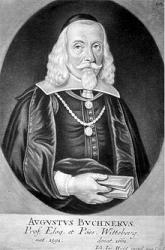1785 - 1860 Person Name: Chr. Sachse Hymnal Number: 627 Author of "Wohlauf, wohlan zum letzten Gang" in Evangelisches Gesangbuch. Nach Zustimmung der Provinszialsznode vom Jahre 1884 zur Einfürung in der Provinz Brandenburg mit Genehmigung des Evangelischen Oberkirchenrats Sachse, Christian Friedrich Heinrich, D.D., was born July 2, 1785, at Eisenberg, Sachse-Altenburg, where his father was cantor, and also master in the town school. In the years 1804-1807 he was a student at the University of Jena (D.D. from Jena 1841), and was, thereafter, for some time, a private tutor at Kleinlauchstedt, near Merseburg. In 1812 he became diaconus at Meuselwitz, near Altenburg. He was appointed, in 1823, Court preacher at Altenburg; and also, in 1831, Consistorialrath. After 1849 he had many trials to endure, for seven children and his wife predeceased him, leaving him only one daughter; while his bodily infirmities compelled him, in 1859, to give up his duties in the consistory, and, in Feb. 1860, to resign even his work as Court preacher. He died at Altenburg, Oct. 9, 1860 (Koch, vii. 22; O. Kraus, ed. 1879, p. 418, &c).
By his earlier hymns, published in 1817, in connection with the Tercentenary of the Reformation, Sachse had a share in the reawakening of Churchly life among the Lutherans. The more important of his other hymns appeared in his Geistliche Gesänge zum Gebrauch bei Beerdigungen und bei der Todtenfeier, Altenburg, 1822 [Hamburg Library]; and were written, to be used at funerals, during his resi¬dence at Meuselwitz; or for use at the special service introduced there in 1819, and held in memory of the departed, on the evening of the last day of the year. A number of his later hymns, together with selections from his secular poems, were published posthumously, as his Gedicht, Altenburg, 1861. A considerable number of his hymns passed into the Hamburg Gesang-Buch, 1842, Leipzig Gesang-Buch 1844, and other German hymn-books, prior to 1870.
Those of Sachse's hymns which have been translated into English are:—
i. Wohlan! die Erde wartet dein. Burial. First published, 1822, as above, No. 2, p. 5, in 8 st. of 4 1., entitled, "At the Grave.” Included in Knapp's Evangelischer Lieder-Schatz, 1837, No. 3375 (1865, No. 2947), altered, and beginning, "Lebwohl! die Erde wartet dein." The translation in common use is:—
Beloved and honoured, fare thee well! This is a full and good translation by Miss Borthwick, in Hymns from the Land of Lutehr, 3rd Ser., 1858, p. 56 (1884, p. 176…
ii. Wohlauf, wohlauf zum letzten Gang. Burial. First published, 1822, as above, No. i., p. 3, in 17 stanzas of 5 1ines, entitled "Hymn during the funeral proces¬sion." Stanzas i.-v. seem to have been meant to be sung at the house of mourning; st. vi.-xiv., on the way to the churchyard ; and st. xv.-xvii., at the entrance to the "place of peace." It was sung at his own funeral in 1860…. Of this hymn, the late Dr. James Hamilton, in an article in the Family Treasury, 1860, pt. i., p. 116), wrote thus:—
On behalf of England, we have sometimes envied the brighter hope--the look of Easter Morning-—which seems to linger still in Luther's land. With its emblems, suggestive of resurrection and heaven, its churchyard is not a Pagan burial ground, but the place where believers sleep,—-a true cemetery, to which friendship can find it pleasant to repair and meditate. At the obsequies of Christian brethren, it is not a funeral knell which strikes slowly and sternly; but from the village steeple there sheds a soft and almost cheerful requiem; and though there may be many wet eyes in the procession, there are not many of the artificial insignia of woe, as the whole parish convoys the departed to his 'bed of peaceful rest.’ Once, in the Black Forest, we accompanied to the ‘place of peace,' an old man's funeral, and there still dwells on our ear the quaint and kindly melody which the parishioners sang along the road; and we have sometimes wished that we could hear the like in our own land [Scotland], with its sombre and silent obsequies."
The translation in common use is:—
Come forth! come on, with solemn song. A good translation of st. i.-iii., v., xv.-xvii., by Miss Borthwick, in Hymns from the Land of Luther, 2nd Ser., 1855, p. 68 (1884, p. 126). …
Other translations are: —
(1) "Happy the man who seeks the prize "(st. vi.). By Dr. H. Mills, 1845 (1856, p. 236). (2) "Neighbour, accept our parting song." By Dr. James Hamilton, in the Family Treasury, p. 116, as above; and sung at his own funeral in 1867. (3) "O corpse, thy dwelling's now without." By Dr. G. Walker, 1860, p. 110. (4) “Come forth, move on, with solemn song." In the Christian Examiner, Boston, U.S., Nov. 1860, p. 414.
Another hymn, partly by Sachse, is:—
iii. Der Herr der Ernte winket. Burial. First published, 1822, as above, No. vi., p. 11, in 6 st. of 8 1., entitled, "At the funeral of an aged person." … [Rev. James Mearns, M.A.]
--Excerpts from John Julian, Dictionary of Hymnology (1907)
Christian F. H. Sachse


 My Starred Hymns
My Starred Hymns




